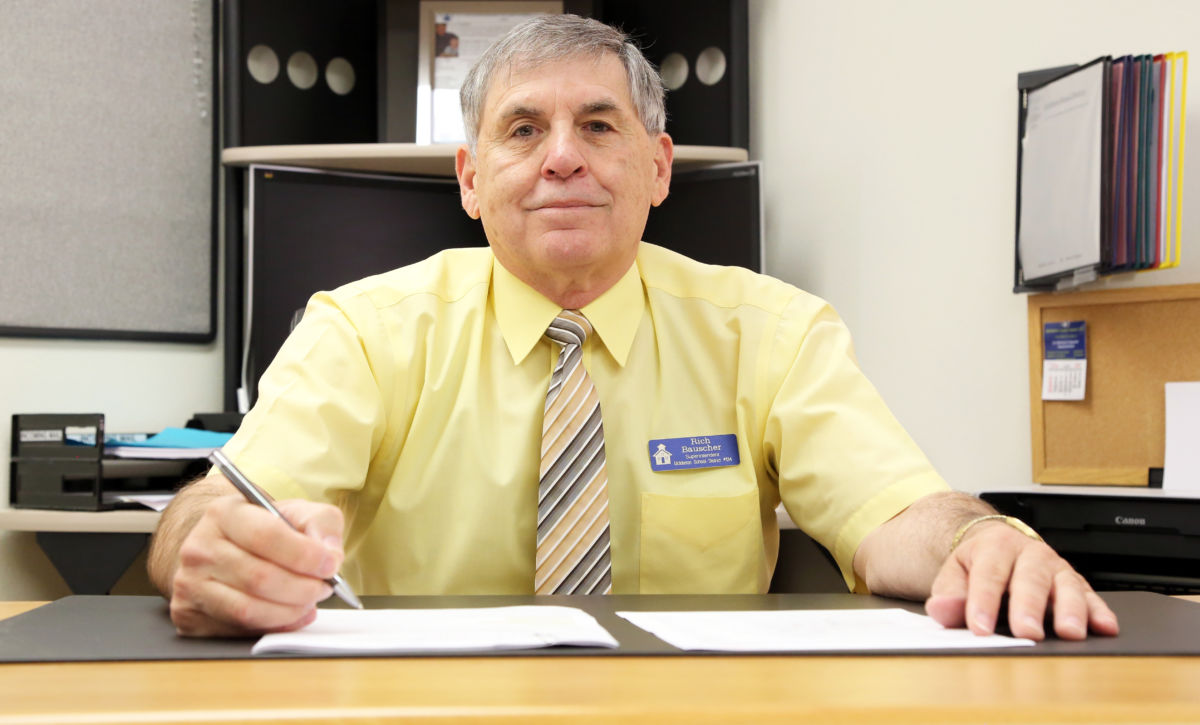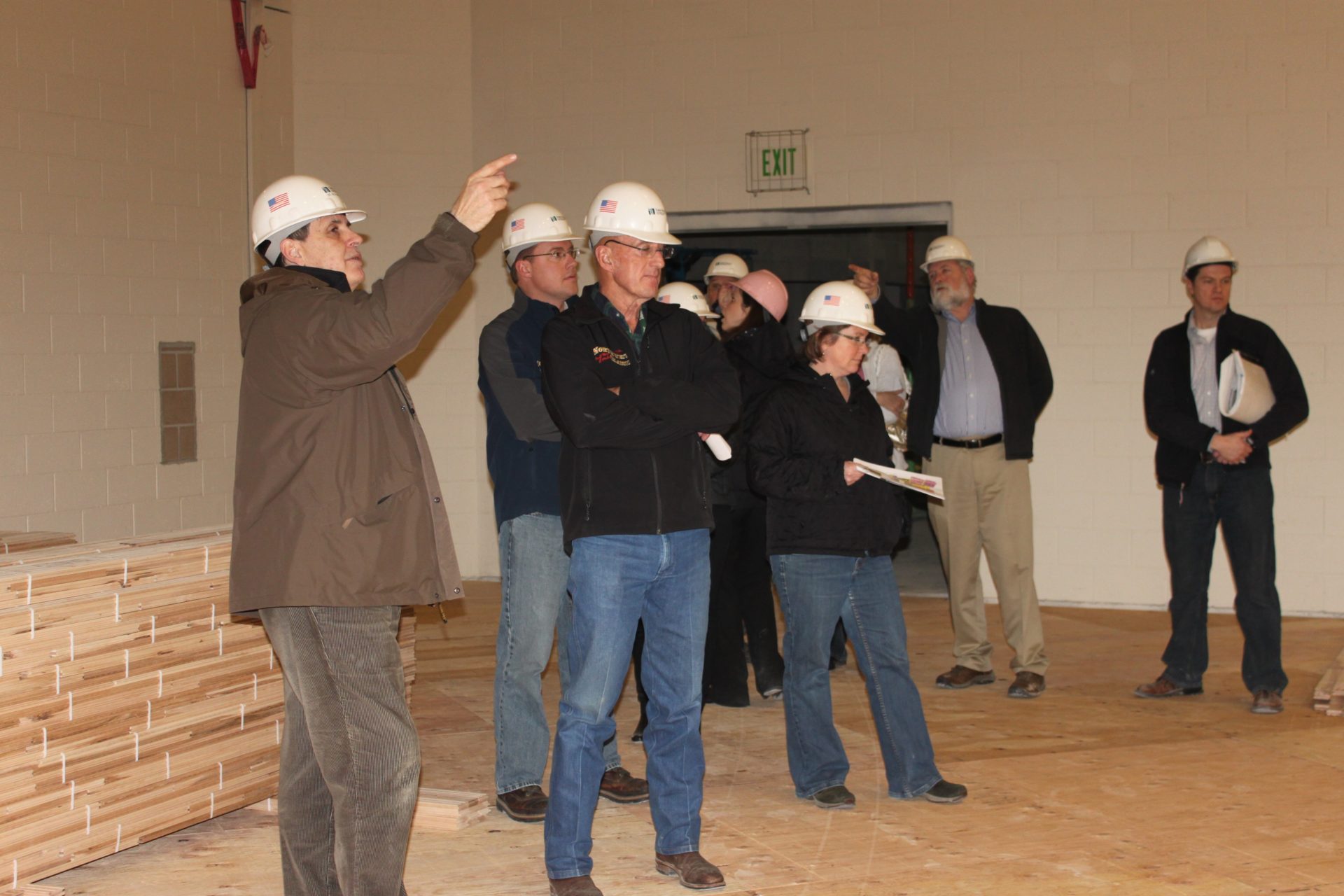
Rich Bauscher’s “no handouts” approach to life and leadership stems from his childhood on a rural Idaho farm, and it propelled him to a long and successful career as an Idaho educator, businessman and parent.
He was once the youngest superintendent in Idaho but quickly climbed ranks to become a leading expert on K-12 facilities in a fast-growing state where funding school construction can be tricky.
Bauscher ended his full-time career in 2016, but his reputation and influence live on. He’s still the “go-to guy” when it comes to funding construction for new buildings, said Idaho Association of School Administrators Executive Director Andy Grover, who sought Bauscher’s expertise through the process as a superintendent years ago in Melba.
With his 70th birthday around the corner, Bauscher still taps into his education, experience and ambitious nature to consult superintendents, teach incoming school leaders and reshape the state’s K-12 landscape.
‘No handouts’
Themes emerge when Bauscher rehashes his childhood spent on an alfalfa farm in Fairfield: milking cows before school, shooting hoops with friends on an asphalt slab by the barn, parents who stressed frugality, no freebies and going to college.
In high school, he played on an “eight-man basketball team with a good coach” that lifted his hoops game to the collegiate level.
He went on to play at the College of Idaho and graduated with P.E. and biological science degrees in 1975.
But his parents’ push for higher education echoed. In 1977, he earned master’s degrees in guidance counseling and school administration from the College of Idaho.
He was more than qualified to work in public education. He just needed some experience.
A ‘kid leading a school’
Armed with three degrees, Bauscher “convinced” the Melba School District to hire him as a math and science teacher.
He was 23, still single and had plenty of time on his hands. So he coached several school sports teams, helped the principal with disciplinary issue and helped the counselor build class schedules.
He liked teaching, but school leadership was the goal. After three years in the classroom, he took a principal job in the tiny southern Idaho town of Oakley, where he married his now-longtime wife LiNae, who had also attended the College of Idaho.
He was 26 — still younger than most of the teachers he oversaw.
“Who’s this kid leading a school?” Bauscher recalled some of them asking.
From principal to ‘soup’

His parents’ call for an education still rang. In 1983, he and LiNae set off with their first child, Mistie, for Washington State University, where he worked as an assistant superintendent in the Pullman School District and earned a doctorate degree in school administration, with an emphasis on facilities, a year later.
He landed his first gig as a superintendent — or “soup” for short, as he calls it — at southern Idaho’s Kimberly district.
Bigger district, bigger role.
He was 31, working long hours while LiNae headed up life at home. The couple worked to pass that “no-handouts” mindset onto their kids. But it was a balancing act, Mistie recently told EdNews. She pointed to a mix of grit, persistence and hard work instilled by her dad and a more loving and patient approach from her mom.
Dad’s emphasis on grit and hard work surfaced publicly over the years. As superintendent of the Middleton district, he made his son Matt, a star athlete who went on to play pro basketball overseas and carries perhaps more name recognition in the Treasure Valley than his dad, attend high school in the nearby Vallivue district. Bauscher wanted to avoid even the appearance of favoritism.
And it wasn’t the first time he expected more out of his kids. Matt recalled playing up on a fourth-grade basketball team as a second-grader.
“I was the worst on the team, but I thought I was the best,” Matt told EdNews, adding that it wasn’t always fun, but he understood his father’s intent.
“It was good for him,” said Bauscher.
Bauscher’s ‘checklist’
As Kimberly’s young superintendent, Bauscher discovered his niche: passing school bonds. In a six-year span at the district, he led the passage of three: one for a new middle school, one for a new high school and one for upgrades to an aging elementary school.
He still talks about the wins in basketball terms: going “three-for-three” — a tricky hurdle in a state that requires two-thirds supermajority voter support to pass a bond issue.
In Kimberly, Bauscher began boiling down what educators today call the “Bauscher checklist,” a 10-step formula for passing a bond. Steps range from building a public-relations plan to conducting community surveys.
It’s not a rigid set of rules, said Bauscher, who adjusts the approach depending district needs and the state of the economy. There’s a construction boom in communities across the state now, he acknowledged, but a decade ago the Great Recession made it tough to build anything.
Which presents another issue: the state’s supermajority threshold for bond issues to pass. School leaders have for decades seen the bar as too high, but many policymakers and patrons say it adds a layer of protection for communities not enthusiastic about footing the bill for a new school or other major facility upgrades.
Bauscher believes 60% is appropriate because many of the measures still fail in the 50-59% range.
“With any bond project you have to weigh out a multitude of factors and make your case with the patrons of the school district,” said Jerome School District Superintendent Pat Charlton, who has worked with Bauscher in various school settings for over 40 years. “Rich was always very skillful in calculating the odds for success long before election day.”
By 1990, the Bauscher family had grown to five. He’d seen success in Kimberly, but felt like a “fish out of water.” Other area soups were in their 50s. He was still in his 30s.
His reputation sparked other opportunities. Architects and construction managers curious about helping districts pass bonds sought his input. Phone calls with questions for the superintendent eventually morphed into a career change. In 1991, Bauscher left education to work for Design West Architects, where he headed up the firm’s educational facilities planning in Idaho, Oregon and Utah.
The foray became a six-year venture helping school leaders learn how to effectively float bonds. Bauscher and two other Idaho superintendents started their own consulting firm in 1997, where he spent three more years working with school leaders across the country.
Today, Bauscher touts having a hand in 67 successful bond campaigns across Idaho, Washington and Oregon.
Where there’s smoke
By 2000, all the travel and consulting work had taken a toll. LiNae needed help raising three kids back home, and the Marsing School District had an opening.
Bauscher became superintendent there in 2000. A year later, he took over the growing Middleton district.
Again, bigger district, bigger role. But his leadership skills, knack for passing bonds and success working with the community would be tested in new ways.
He recalled the day he saw smoke rising above Middleton High School: Feb. 1, 2007, the day before his birthday. Fire trucks, patrons and news crews crammed the road to the school, which suffered a total loss after a boiler fire spread through the hallways.
Bauscher had an immediate crisis on his hands: what to do with some 900 displaced high schoolers, and how to go about rebuilding?

He spent his birthday drafting a plan with district administrators behind closed doors.
“I said, ‘We’re not leaving until we figure out how to keep these kids in the district,'” he told EdNews.
Nine hours later, they opted to squeeze some students into the district’s nearby middle school, redirect others to a local church that opened its doors and purchase several portable classroom units for the rest. (Bauscher later resold the units to another district for a profit to Middleton.)
Insurance kicked in to replace the high school, but Bauscher had his own plan to rebuild the school on a smaller scale to offset the deductible. The rebuilt building would become a middle school, and the growing district would float a bond for construction of an entirely new high school.
The price tag: a whopping $51.9 million. It was a lot for the time, and Bauscher had critics.
“Some people jumped down me for that,” he said.
But Middleton trustees bought in, and it paid off. Eighty-six percent of voters went on to support the measure. Despite the devastating blaze, Middleton would get a new middle school and a state-of-the-art high school.

Non-retirement
Bauscher called it quits in Middleton in 2016, after 15 years with the district.
But he didn’t retire. Today, he teaches education courses part-time as an adjunct professor at the University of Idaho. A major focus: helping future school leaders understand the complexities of building schools in the nation’s fastest growing state.
“They aren’t going to get that anywhere else,” Bauscher said.
And he still consults school leaders on bond issues through a side business.
Times have changed. He’s no fan of the “social media” approach some local leaders take to passing bonds, opting instead for the more on-the-ground emphasis his checklist stresses.
Some districts take his advice, others don’t, he acknowledged.
And walking legal lines aimed at limiting districts’ bond activities to informational purposes only has been another challenge. In 2019, three years after retiring, the Idaho Freedom Foundation accused the Salmon School District, which had signed a consulting contracted with Bauscher, of violating Idaho’s Public Integrity in Elections Act, which prohibits “public funds, resources or property” from being used to advocate for a ballot measure.
Local authorities investigated, but EdNews could not find that anything came of it.
Bauscher denied promoting the measure, but said the ordeal permanently changed his approach. Now, he gets paid “strictly” by the citizens groups that raise funds for bond issues “so that the line is black and white, not grey.”
Consulting has been enough to keep him busy these days. But without his own monthly board meetings to attend, the former superintendent has more time for family:
- Mistie, 40, is a prominent Boise attorney who argued successfully for the acquittal of former Fruitland High School Principal Mike Fitch, who faced three misdemeanor sex crime charges in 2019.
- Matt, 36, is a top-grossing Idaho realtor, who like Dad, earned a master’s degree. He became captain of Boise State’s basketball team after high school and played professionally overseas for eight years.
- Megan, 31, is a nurse practitioner working on a doctorate degree in nursing.
While her dad was often busy, Mistie said, she recalled tagging along with him for dinner and school board meetings, or hitting one of the many school basketball games he used to officiate to “stay in shape.”
“And somehow, he still made it out to our basketball games, debates and tennis matches,” she said.

